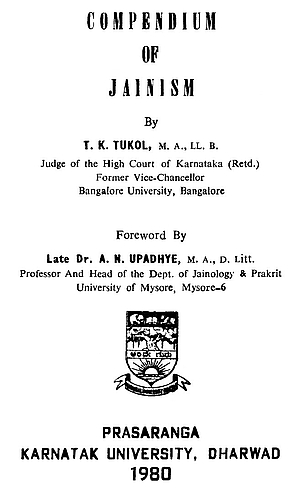This Compendium is a systematic treatise on Jainism. Even a glance at the titles of the Chapters gives an idea of the vast range of topics discussed by the learned author in this work.
Jainism is an ancient religion. When the Jaina studies were in their infancy, there were many misconcepts about its antiquity etc., but now they are all being cleared with the advance of studies carried on by Indian and Eastern scholars. The holy dignitaries like Vṛṣabha, Pārśva, Mahavira, whose biographies are succinctly sketched here, have enriched the cultural wealth of this land. The post- Māhavīra career of Jainism, especially its spread to the South and subsequent schisms are a fascinating chapter in the religious history of India. The Jaina concepts of divinity and worship, of the Universe and its constituents, of the sentient world and its elaborate details etc., deserve the special attention of a student of comparative religion.
That Karma is a subtle variety of matter affecting one's spiritual destiny by its association with the Ātma operates automatically and functions as an irresistible moral law which leaves no scope for any divine intervention in the affairs of all living beings. Everyone must reap the fruits of his own thoughts, words and deeds. The fundamental principles like the Tattvas or Padārthas and the stages of spiritual progress (Guṇasthānas) fully work out the relation between the Atman and the Karman in details. The liberation of the Atman from the clutches of Karman depends upon the cultivation of Right Faith, Right Knowledge and Right Conduct working in Unison.
Jainism is rightly called Ethical Realism; and it has laid great stress on good conduct, One for the layman and the other for the ascetic. The former is less rigorous than the latter. The ascetic observes the Māhavṛatas ideally; he lives a spiritual life, devoted to meditation and absolute possessioniessness (aparigraha). One who has no attachment of any kind faces death voluntarily; he is not afraid of death, because he knows that his soul is immortal. With such high ethical ideals, Jainism has enriched the Indian heritage and culture in various ways. The doctrines of Ahimsa, Anekanta and Aparigraha have more relevance today than before, as humanity is now facing many ethical and spiritual problems created by scientific and technological advancements.
There are a number of manuals already dealing with Jainism but the present Compendium has its specialities. The author's discussion of the various topics is authentic, supported by relevant verses and sutras from the scriptures with comments thereon. As such, it should be welcome to all critical readers who want to understand Jainism in a non-technical set-up. Jainism is not only a religion and a well-knit philosophy, but also a way of life which has given spiritual solace to a number of laymen and saints that have relinquished the ties of the world.
Justice T. K. Tukol has a remarkable blend in himself of the polished expression of a Professor of English, cogent argue" mentation of a gifted advocate, the balanced presentation of an experienced judge and the intellectual penetration of an earnest inquirer into truth and reality. He has ever been a close and critical student of Jainism, apart from being a pious Śrāvaka. All these qualities of Justice Tukol are transparent in this Compendium which is an outcome of his deep study and understanding of Jnana, Nayas, God, Creation and Anekāntavāda in a lucid manner. He has cleared many wrong notions of earlier scholars and presented those tenets in their proper perspective.
A careful study of Justice Tukol's exposition will give a correct understanding of Jainism which holds an important position among Indian philosophical systems and has influenced the Indian pattern of thinking and way of life in many areas.
University of Mysore
Manasa Gangotri, Mysore-6
May 22, 1975.
A. N. Upadhye
 Justice T.K. Tukol
Justice T.K. Tukol
